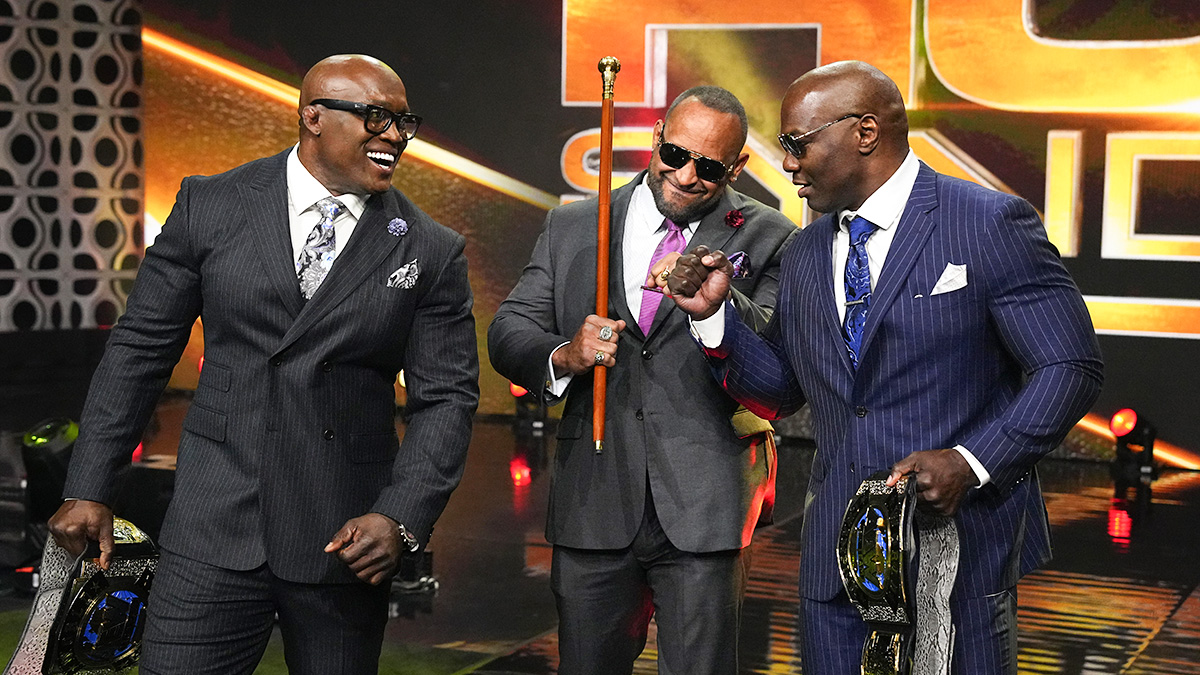Backstage Tension Grows Around AEW’s Hurt Syndicate and MVP

Since their debut, The Hurt Syndicate has been a dominant presence in AEW’s tag team division. Comprising Bobby Lashley, Shelton Benjamin, and their manager MVP, this faction has carved out a reputation for overwhelming their opponents with power and precision. Despite their nearly 200-day reign as AEW World Tag Team Champions, recent backstage whispers suggest that not everyone in AEW locker rooms is thrilled with the group’s conduct and creative direction.
Fightful Select recently reported that The Hurt Syndicate was expected to drop their tag titles to FTR at a marquee event, either “All In: Texas” or “Forbidden Door.” However, sources indicate that MVP rejected this idea on behalf of Lashley and Benjamin. Instead, the trio allegedly prefers passing the titles to one of the younger teams such as Private Party, Gates of Agony, or The Outrunners—all of whom have been defeated by The Hurt Syndicate before. This decision reportedly frustrated some AEW insiders who wanted the champions to lose to FTR, a team seen as highly credible and influential.
Further complicating matters, MVP is said to have developed tension with “Speedball” Mike Bailey for unclear reasons. According to the report, MVP strongly opposed any possibility of Lashley and Benjamin losing to JetSpeed, even though this outcome was apparently never officially considered. Despite generally positive camaraderie throughout the AEW locker room, frustration is said to be mounting with The Hurt Syndicate’s style and behavior. The group is described as heels who perform impressive moves, dominate their foes, and then casually give fans high fives as they exit—a combination that some feel undermines their ability to generate genuine heat or hostility from the audience.
Shortly after these rumors circulated on social media, MVP posted a cryptic tweet that seemed to respond indirectly to the chatter, though he did not explicitly address any of the allegations. This added fuel to the speculation around backstage relations.
Regardless of the full accuracy of these reports, there is some validity to the criticisms aimed at The Hurt Syndicate. For months, critics have pointed out that despite their talent and dominance, Lashley and Benjamin have failed to truly capture the menace and intimidation expected of a top heel faction. Their alliance with Maxwell Jacob Friedman once promised to recreate a legendary stable dynamic similar to the Four Horsemen of wrestling lore, but the chemistry and storytelling fell short.
What sets heels apart from babyfaces often boils down to motivation and intent. Lashley and Benjamin operate with a business-like demeanor. They batter opponents with overwhelming force but do so without apparent malice or excessive brutality. Their actions come across as professional and transactional rather than vindictive. This absence of clear villainous intent may explain why they struggle to elicit strong negative reactions from the crowd.
MJF’s sudden departure from The Hurt Syndicate, though surprising to some, felt like a necessary step for both sides. It happened around the same time AEW aired a segment where Adam Copeland hired The Hurt Syndicate to attack FTR, perhaps foreshadowing a shift in the faction’s narrative direction.
There are creative opportunities that could reshape how The Hurt Syndicate is perceived. MVP has repeatedly described Lashley and Benjamin as being “in the business of hurting people.” But what exactly does that mean? Wrestling fans often need clear explanations to fully engage with a storyline. If The Hurt Syndicate were portrayed as mercenaries or hired guns, similar to the Acolytes Protection Agency in WWE, they could inhabit a morally gray space that feels fresh and compelling.
This approach would not only clarify their motivations but also prevent them from losing purpose after their eventual title loss. With rumors that all three members have long-term contracts, recontextualizing The Hurt Syndicate could inject new life into their characters and sustain their relevance for years to come.
AEW fans will be watching closely to see how this backstage drama influences the group’s trajectory, both on television and behind the scenes.